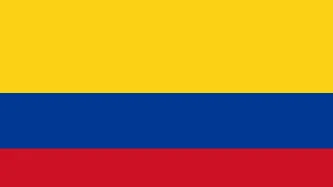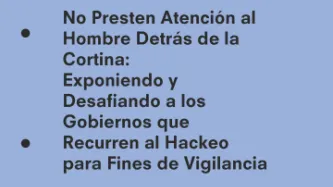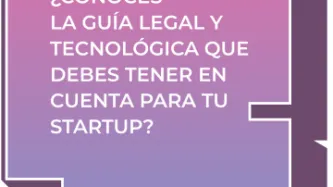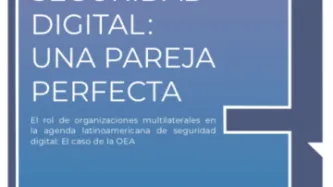Search
Content type: Examples
Ontario allocates $30 million to install new security technologies and vape detectors, expanding their surveillance apparatus whilst contributing to an overall cut in funding per student. Some of the vape detectors installed in Canadian schools include noise detectors, however there is a lack of transparency in how data is collected or used, and evidence for their efficacy in keeping students safe is lacking. Link to article: https://theconversation.com/vaping-in-schools-ontarios-30-…
Content type: Examples
The Court of Appeals for British Columbia rejected the claim made by whistleblower Ian Linkletter that linking to freely available materials from the remote proctoring company Proctorio was legitimate criticism. The company has a history of attacking those who criticise it and its products. Linklater, while working as Learning Technology Specialist at the University of British Columbia in 2020, issued a number of criticisms of its approach on Twitter, and linked to "unlisted" (public but not…
Content type: Advocacy
Dejusticia, Fundación Karisma, and Privacy International submitted a joint stakeholder report on Colombia to the 44th session of the Universal Periodic Review at the UN Human Rights Council.Our submission raised concerns regarding the protection of the rights to freedom of expression and opinion, to privacy, and to personal data protection; the shutdown of civil society spaces; protection of the right to protest; and protection of the rights of the Venezuelan migrant and refugee population.…
Content type: Examples
In a report, the Privacy Coimmissioner of Canada has said that online proctoring tools used to conduct remote exams fail to get sufficiently free, clear, and individual consent from students. Besides this overreach, the report identifies factors that may trigger false alerts and errors in the biometric tools incorporated into the software. The report ends by calling for reflection on how to identify uses of AI that should be prohibited.https://www.biometricupdate.com/202211/online-proctoring-…
Content type: Long Read
This piece was written by Joan López, researcher at Fundación Karisma, and originally posted on their website.
The uncertainty of this crisis has become an opportunity for the implementation of technological solutions to complex issues instead of coherent decision-making processes. During the social and economic crisis caused by Covid-19, the National Development Office (DNP in Spanish) in Colombia, in just two weeks, set up an unconditional cash transfer system for 3 million citizens. The…
Content type: Examples
Dejusticia, Colombia-based research and advocacy organisation, delivered a series of recommendations to the Ministry of Health and Social Protection to be taken into account when issuing the next decree on vaccination against Covid-19.
Their recommendations include:
Adding the principle of non-discrimination to the plan to be proposed;
Requesting that the population deprived of liberty be vaccinated sooner than proposed to ensure they are detained in decent conditions;
Ensuring the…
Content type: Examples
Canada has a reputation, both at home and around the world, as a beacon of tolerance when it comes to acceptance of immigrants and refugees. Part of this is due to the favourable attitudes of Canadians on the issue. Over the decade, the balance of opinion in Canada has become increasingly positive about the number of immigrants arriving in Canada and the benefits they bring to the country’s economy.
Is the dramatic impact of the global COVID-19 pandemic, causing Canadians to reconsider their…
Content type: Examples
Corruption scandals have added to Latin America’s challenges in dealing with the coronavirus. In Ecuador, prosecutors identified a criminal ring that colluded with health officials to sell body bags to hospitals at 13 times the normal price, and many others are accused of price-gouging for other medical supplies.
The former Bolivian health minister is under house arrest awaiting trial on corruption charges, government officials in seven Brazilian states are under investigation for misusing…
Content type: Examples
An audit of two apps and a website used by national and local governments in Colombia finds: an absence of public information about the tools, how they work, or how their security and privacy is protected; non-compliance with Colombia’s data protection legal framework, particularly in the area of consent; and reckless deployment of solutions that put hundreds of thousands of users’ personal data at risk. Fundación Karisma, which conducted the audit, makes a number of recommendations for…
Content type: Examples
Human Rights Watch reports that drug cartels and rebel groups are imposing their own lockdowns in rural areas of Colombia and using WhatsApp chats and pamphlets to advise local residents of curfew hours, transport shutdowns, and other bans that are far more strict than those imposed by the government. They have murdered at least eight civilians. In some areas, violent gangs are preventing people from leaving their homes at all, in two provinces armed groups have punished violators by torching…
Content type: Examples
Colombia will adopt the Apple-Google contact tracing platform after finding it necessary to remove the contact tracing functions from CoronApp, the official Colombian coronavirus information app because they didn’t work. CoronApp was downloaded by 4.3 million people, and includes features to report symptoms and locate cases on a map. The contact tracing features, which were supposed to be able to overcome the limitations of the iPhone’s Bluetooth implementation, were provided by the Portuguese…
Content type: Examples
Our partners from Karisma in Colombia analysed three different technological solutions intending to deal with the COVID-19 pandemic, finding vulnerabilities in them (in Spanish).
Link: https://web.karisma.org.co/que-sabemos-de-las-tres-herramientas-que-se-anuncian-como-soluciones-tecnologicas-para-el-manejo-del-covid-19/
Content type: Examples
Civil Society advocates, including PI, expressed their dissaproval of a letter from the Colombian Data Protection Authority, which was intending to give a blank exception to the government in relation with handling the pandemic.
Link (in Spanish): https://web.karisma.org.co/organizaciones-de-la-sociedad-civil-rechazan-circular-de-la-sic-sobre-uso-de-datos-personales-para-controlar-la-pandemia/
Content type: Examples
The mother of a six-month-old baby in Aurora, Ontario was fined C$880 after police accused her of standing for more than two minutes under a gazebo in a park; she claims she pulled into the gazebo to allow people to pass on the path and answered a text before moving back onto the path. The mother reported that the police officer who issued the fine did not observe social distancing and was not wearing personal protective equipment. The incident occurred a week after the city of Toronto stopped…
Content type: Examples
Under Ontario's Emergency Management and Civil Protection Act, which prohibits gatherings of more than five people, public health officials in Ottawa are pushing citizens to avoid even apparently innocuous activities such as talking across a fence to a neighbour or drinking a beer on your home's driveway with a friend, on the grounds that these can escalate into parties.
Source: https://ottawacitizen.com/news/local-news/physical-distancing-loopholes-need-to-stop-ottawa-health-official-says/…
Content type: Examples
In one of its pandemic-related emergency orders, the Canadian province of Ontario has extended to police officers, First Nations constables, special constables, and municipal by-law enforcement officers the power to require those facing charges under the emergency laws to give their name, date of birth, and address or face fines of up to C$750 for non-compliance.
Source: https://toronto.ctvnews.ca/those-violating-ontario-s-emergency-orders-must-id-themselves-or-face-steep-fine-1.4877062…
Content type: Examples
Canadian federal, provincial, and territorial governments across have put in place numerous emergency measures to curtail behaviour in order to curb the spread of COVID-19. The orders include placing people under quarantine, limiting gatherings, closing schools and businesses, barring most visits to long-term care homes, prohibiting price gouging on necessary goods, and permitting audiovisual witnessing of signatures on wills and powers of attorney.
Source: https://www.intrepidpodcast.com/blog…
Content type: Examples
In a sharp drop from the beginning of Canada's lockdown, after two months only one in six Canadians left their home on weekends compared to one in three at the beginning. The marketing company Environics Analytics compiled the report by analysing a database of anonymised location data from 2.3 million mobile phones and looking for people who went at least 100 metres beyond their home postal code for a minimum of 30 minutes on at least one weekend day, and used demographic information tied to…
Content type: Examples
Montreal police have launched an online system to enable residents to report suspicious activity such as group gatherings after police officers noticed significant crowding in certain areas of the city. Both the Montreal police and the province's Sureté du Québec can hand out an on-the-spot $1,000 ticket for both indoor and outdoor illegal gatherings. Travellers returning to Canada who refuse to comply with self-isolation requirements can be fined up to $200,000 and up to six months in prison.…
Content type: Examples
A day after John Tory, the mayor of the City of Toronto, told thousands of attendees at an online event hosted by TechTO that the city was gathering cellphone location data from telecoms in order to identify areas where residents were still congregating despite the city's social distancing rules, he withdrew the claim. City staff explained that an offer had been made to share anonymous cellphone location data with the City and it had been passed along to Toronto Public Health and the Emergency…
Content type: Examples
Metrolinx, the public transport agency for the Canadian province of Ontario says that, on request, it gave Toronto Public Health contact information associated with registered Presto payment cards used on specific trips, after a 40-year-old man was diagnosed with coronavirus (COVID-19). The agency revealed the news on Twitter and said that compelling circumstances affecting the health and safety of individuals under the Ontario privacy act (FIPPA) permits the disclosure of personal…
Content type: Examples
Colombia's has launched the free, Android-only, prevention-focused Colombia-Coronapp developed by the National Health Institute (INS) to help identify and eradicate the virus across the country, as well provide centralisation and transparency. Besides their basic information, users are asked to say if they have participated in any mass events in the prior eight days, a controversial question because of the recent protests across the country. The app also provides safety tips, an updated map of…
Content type: Examples
In an effort to improve political advertising transparency, Canada drafted a Bill that requires companies to develop ad libraries, to which ads are added immediately in order for researchers, journalists, and other people to be able to search and understand how political actors are targeting ads. In response, Google announced that it would blanket-ban all political ads in Canada, saying the company was unable to comply with the new law. Google’s decision shows both that the current state of…
Content type: Examples
The rise of social media has also been a game changer in the tracking of benefits claimants. Back in 2009, the case of Nathalie Blanchard a woman in Quebec who had lost her disability insurance benefits for depression because she looked “too happy” on her Facebook pictures had made the news.
https://abcnews.go.com/Technology/AheadoftheCurve/woman-loses-insurance-benefits-facebook-pics/story?id=9154741
Author: Ki Mae Heussner
Publication: ABC News
Content type: News & Analysis
The first half of 2018 saw two major privacy moments: in March, the Facebook/ Cambridge Analytica scandal broke, followed in May by the EU General Data Protection Regulation ("GDPR") taking effect. The Cambridge Analytica scandal, as it has become known, grabbed the attention and outrage of the media, the public, parliamentarians and regulators around the world - demonstrating that yes, people do care about violations of their privacy and abuse of power. This scandal has been one of…
Content type: Long Read
The Privacy International Network is celebrating Data Privacy Week, where we’ll be talking about how trends in surveillance and data exploitation are increasingly affecting our right to privacy. Join the conversation on Twitter using #dataprivacyweek.
In the era of smart cities, the gap between the internet and the so-called physical world is closing. Gone are the days, when the internet was limited to your activities behind a desktop screen, when nobody knew you were a dog.
Today, the…
Content type: State of Privacy
Table of contents
Introduction
Right to Privacy
Communication Surveillance
Data Protection
Identification Schemes
Policies and Sectoral Initiatives
Introduction
Acknowledgement
The State of Privacy in Colombia is the result of an ongoing collaboration by Privacy International and Fundación Karisma and Dejusticia.
Key Privacy Facts
1. Constitutional privacy protection: The constitution contains an explicit protection of the right to privacy (Article 15 of the 1991 constitution).
2…
Content type: Advocacy
Tanto la privacidad como la seguridad son esenciales para proteger a los individuos, su autonomía y su dignidad. El detrimento de la privacidad implica el detrimento de la seguridad de los individuos, sus dispositivos y la infraestructura de la que forman parte. La gente necesita privacidad para sentirse libremente segura y proteger su información, así como para gozar plenamente de otros derechos.
Una cantidad cada vez mayor de Gobiernos en el mundo está recurriendo también al hackeo para…
Content type: News & Analysis
Actualmente, las empresas tecnológicas se encuentran inmersas en constante cambio. Uno de ellos es la creciente importancia que ha cobrado la seguridad digital, convirtiéndose en una prioridad. Que un emprendimiento resguarde su seguridad digital significa que puede gestionar los riesgos asociados a mantener la confidencialidad, integridad y disponibilidad de su información.
En este contexto, resulta de gran relevancia que las personas responsables del emprendimiento digital y el…
Content type: News & Analysis
El objetivo es facilitar a la sociedad civil una guía para la navegación de este organismo, efectuar un diagnóstico que permita situar cualquier persona interesada sobre la actualidad de la temática a nivel regional y descubrir la agenda de seguridad digital que sostiene la OEA en el continente.
Finalmente, concluimos con una serie de breves recomendaciones dirigidas a los organismos de la OEA. Con ello, esperamos que este órgano reconozca el papel que puede jugar como catalizador en el…








